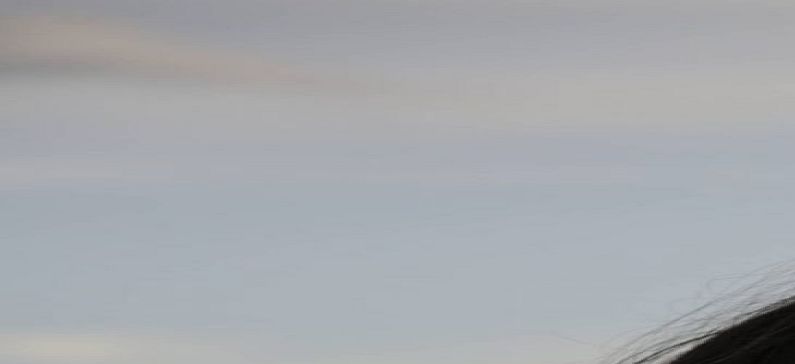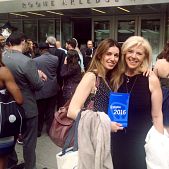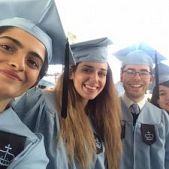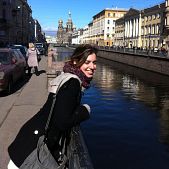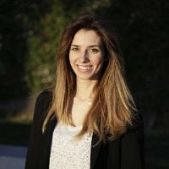- Did you grow up in the typical as we say Greek family?
My parents divorced when I was 7 years old. I was raised by my mother and my grandmother, so I wouldn’t say it was the typical Greek family model. I can tell you that what I am today I owe it to these two women. They both supported me every step of the way, they always believed in me and pushed me to aim high. I could not have succeeded so much at Columbia and in life if it wasn’t for them.
- Where did your parents come from and what is your connection with your roots ?
My mother, Vasiliki Marinaki, is a well-known lawyer in the city of Alexandroupolis. My family on my mother’s side has been a family of lawyers and doctors dating back to my great grandfather. I feel very proud of my family heritage and has inspired me throughout my life.
- Do you have any special memories from your childhood?
I was an obedient kid who wouldn’t create troubles. I had always been a good student. When I was 15 years old I became really passionate about Astrophysics and participated in national competitions in Greece where I had won seventh place out of 300 candidates. The prize was an educational trip to NASA in the US for the first boy and girl in the competition, which sadly I never won. My interest in physics and mathematics led me to follow my studies at the Department of Electrical and Computer Engineering in Aristotle University of Thessaloniki.
- You created software that caught the eye of the New York Times. Tell us a few things about it
The software I developed was my Master’s thesis at Columbia University. As Master’s students in the dual degree program in Computer Science and Journalism, we had to select a topic for our thesis that touches on both areas and suggests ways in which Computer Science can aid the profession of Journalism. I decided to build a software tool for newsrooms that could help journalists and producers tag news content. Tags are keywords that convey the essence or the meaning of a piece of content. For example, an article on Syrian refugees could be tagged with the words refugees and crisis. Even though tags is a very prominent element in our every day life due to social media, many news organizations haven’t fully understood the value of associating tags with their content, a realization that came out after research and interviews I conducted with news organizations. News content tags can be valuable for archiving content and retrieving articles on a specific topic or keyword or even promoting news content through search engines or social networks. It is the simplest form of indexing and labeling content. This inspired me to pursue the idea of building an automated software tool that could read news articles it has never seen before and suggest relevant tags to the user. That way it can help news producers, editors or journalists figuring out the proper tags for an article, which as a standalone task without any help from a computer can be quite cumbersome and hard. Tagging as a standalone task requires the person who selects the tags to read the article and understand the meaning and the topic the writer focuses on. When this process includes a large number of articles it becomes really difficult and slow when done only by a human. The software tool I built suggests tags in a fast and responsive way to the person who does the tagging and helps them make a decision on tags quicker and consider keywords they wouldn’t have otherwise. The New York Times, where I had interned last summer, helped me with developing this tool by giving me 15000 articles from their archives, which I used to train the algorithms I built for the automated tagger tool. They also advised me through the development process, helped me test the tagger tool and gave me feedback after I completed it.
- How did you choose this field of expertise?
After I completed my degree as a Electrical and Computer Engineer I started working in CERTH (Center of Research and Technology Hellas) and specifically in Information Technologies Institute. There I worked on a project funded by the European Union where we built a web platform that detects trends and viral news in social networks. For the project, we collaborated with news organizations, such as the Deutsche Welle, the BBC and the Yahoo! news lab. This sparked my interest in journalism and specifically in computational journalism, which is an up and coming area, and motivated me to pursue the dual master’s degree at Columbia University.
- How hard is life away from your birthplace?
It is quite hard. I miss my family and my friends from Greece a lot. However, at the same time it is a constant challenge to prove to myself that I can make it despite the difficulties.
- What should we expect from you in the future?
I am starting as a software engineer at The New York Times in a few days. I am very excited for the role and everything it entails. My plan is to stay in the news business offering my engineering and journalism skills and trying to serve and improve the way journalism happens across the world.
- What is your motto in life?
I don’t really have a motto but if I had it would probably be something like “Start living the life you are dreaming.” Life is too short for constantly postponing what you want to do in life.
- How often do you visit Greece?
Once or twice every year.
- What does Greece mean for you?
Greece to me is home. In my head, it is a colorful and a gray place at the same time. Colorful because of all its beauties and the people and the great memories I have created here. Gray because despite all it can offer it is suffering great hardships and there’s still no indication when they are going to end.
- If you could address a question to all Greeks, what would you like to ask them?
One of the most famous quotes from John F. Kennedy’s inaugural address to the American people was “ask not what your country can do for you, ask what you can do for your country.” I guess my question to my fellow Greeks would be somewhat the same. “What can you do for your country?”
